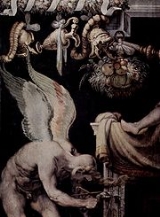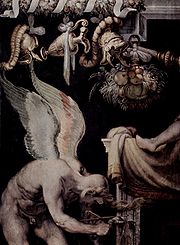
Kairos
Encyclopedia

Ancient Greek
Ancient Greek is the stage of the Greek language in the periods spanning the times c. 9th–6th centuries BC, , c. 5th–4th centuries BC , and the c. 3rd century BC – 6th century AD of ancient Greece and the ancient world; being predated in the 2nd millennium BC by Mycenaean Greek...
word meaning the right or opportune moment (the supreme moment). The ancient Greeks had two words for time, chronos
Chronos
In Greek mythology, Chronos in pre-Socratic philosophical works is said to be the personification of time. His name in Greek means "time" and is alternatively spelled Chronus or Khronos.Chronos was imagined as an incorporeal god, serpentine in form, with three heads—those of a man, a bull, and...
and kairos. While the former refers to chronological
Chronology
Chronology is the science of arranging events in their order of occurrence in time, such as the use of a timeline or sequence of events. It is also "the determination of the actual temporal sequence of past events".Chronology is part of periodization...
or sequential time
Time
Time is a part of the measuring system used to sequence events, to compare the durations of events and the intervals between them, and to quantify rates of change such as the motions of objects....
, the latter signifies a time in between, a moment of indeterminate time in which something special happens. What the special something is depends on who is using the word. While chronos is quantitative, kairos has a qualitative nature.
Kairos (καιρός) also means weather in both ancient and modern Greek. The plural, καιροι (kairoi or keri) means the times.
In rhetoric
In rhetoricRhetoric
Rhetoric is the art of discourse, an art that aims to improve the facility of speakers or writers who attempt to inform, persuade, or motivate particular audiences in specific situations. As a subject of formal study and a productive civic practice, rhetoric has played a central role in the Western...
kairos is "a passing instant when an opening appears which must be driven through with force if success is to be achieved."
Kairos was central to the Sophists, who stressed the rhetor's ability to adapt to and take advantage of changing, contingent circumstances. In Panathenaicus, Isocrates
Isocrates
Isocrates , an ancient Greek rhetorician, was one of the ten Attic orators. In his time, he was probably the most influential rhetorician in Greece and made many contributions to rhetoric and education through his teaching and written works....
writes that educated people are those “who manage well the circumstances which they encounter day by day, and who possess a judgment which is accurate in meeting occasions as they arise and rarely misses the expedient course of action".
Kairos is also very important in Aristotle's
Aristotle
Aristotle was a Greek philosopher and polymath, a student of Plato and teacher of Alexander the Great. His writings cover many subjects, including physics, metaphysics, poetry, theater, music, logic, rhetoric, linguistics, politics, government, ethics, biology, and zoology...
scheme of rhetoric. Kairos is, for Aristotle, the time and space context in which the proof
Proof
Proof may refer to:* Proof , sufficient evidence or argument for the truth of a proposition* Formal proof* Mathematical proof, a convincing demonstration that some mathematical statement is necessarily true...
will be delivered. Kairos stands alongside other contextual elements of rhetoric: The Audience, which is the psychological and emotional makeup of those who will receive the proof; and To Prepon, which is the style with which the orator clothes their proof.
In Christian theology
In the New TestamentNew Testament
The New Testament is the second major division of the Christian biblical canon, the first such division being the much longer Old Testament....
kairos means "the appointed time in the purpose of God", the time when God acts (e.g. Mark 1.15, the kairos is fulfilled). It differs from the more usual word for time which is chronos (kronos).
In the Eastern Orthodox and Eastern Catholic churches, before the Divine Liturgy
Divine Liturgy
Divine Liturgy is the common term for the Eucharistic service of the Byzantine tradition of Christian liturgy. As such, it is used in the Eastern Orthodox and Eastern Catholic Churches. Armenian Christians, both of the Armenian Apostolic Church and of the Armenian Catholic Church, use the same term...
begins, the Deacon
Deacon
Deacon is a ministry in the Christian Church that is generally associated with service of some kind, but which varies among theological and denominational traditions...
exclaims to the Priest
Priest
A priest is a person authorized to perform the sacred rites of a religion, especially as a mediatory agent between humans and deities. They also have the authority or power to administer religious rites; in particular, rites of sacrifice to, and propitiation of, a deity or deities...
, "Kairos tou poiesai to Kyrio" ("It is time [kairos] for the Lord to act"); indicating that the time of the Liturgy is an intersection with Eternity.
In The Interpretation of History, neo-orthodox
Neo-orthodoxy
Neo-orthodoxy, in Europe also known as theology of crisis and dialectical theology,is an approach to theology in Protestantism that was developed in the aftermath of the First World War...
Lutheran theologian Paul Tillich
Paul Tillich
Paul Johannes Tillich was a German-American theologian and Christian existentialist philosopher. Tillich was one of the most influential Protestant theologians of the 20th century...
made prominent use of the term. For him, the kairoi are those crises in history (see Christian existentialism
Christian existentialism
Christian existentialism describes a group of writings that take a philosophically existentialist approach to Christian theology. The school of thought is often traced back to the work of the Danish philosopher and theologian considered the father of existentialism, Søren Kierkegaard...
) which create an opportunity for, and indeed demand, an existential decision by the human subject - the coming of Christ being the prime example (compare Barth's use of geschichte as opposed to historie). In the Kairos Document
Kairos Document
The Kairos Document is a theological statement issued in 1985 by a group of black South African theologians based predominantly in the black townships of Soweto, South Africa. The statement challenged the churches' response to what the authors saw as the vicious policies of the Apartheid state...
, an example of liberation theology
Liberation theology
Liberation theology is a Christian movement in political theology which interprets the teachings of Jesus Christ in terms of a liberation from unjust economic, political, or social conditions...
in South Africa under apartheid, the term kairos is used to denote "the appointed time", "the crucial time" into which the document or text is spoken.
See also
- Carpe diemCarpe diemCarpe diem is a phrase from a Latin poem by Horace that has become an aphorism. It is popularly translated as "seize the day"...
- Kāla (time)
- Madeleine L'Engle (Kairos)
- RtuRtuRitu in Vedic Sanskrit refers to a fixed or appointed time, especially the proper time for sacrifice or ritual in Vedic Religion, The word is so used in the Rigveda, the Yajurveda and the Atharvaveda...
- Window of opportunityWindow of opportunityWindow of opportunity may refer to:* Launch window, a phrase used in space exploration* Early learning windows as used in the Abecedarian Early Intervention Project* Term used during the Gulf War when taking out prominent leaders...
Resources
- R. B. Onians, The Origins of European Thought (Cambridge: Cambridge University Press, 1951), pp 343–49
- E. C. White Kaironomia: on the will to invent (Ithaca and London: Cornell University Press, 1987)
- Leonard Sweet Missed Moments (Rev. Magazine Jan/Feb 2005), pp. 36
- Paolo Moreno, L'attimo fuggente in Archeo magazine (XXII, 10, 260), October 2006, pp 114–117.
- Mick Doherty "Kairos: Layers of Meaning" (Dept of English, Texas Tech University)
- London, Jack. “To Build a Fire.” Lost Face. New York: The Macmillan Company, 1910.

